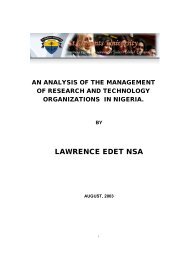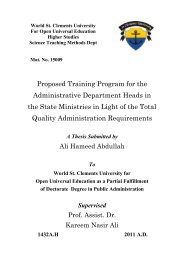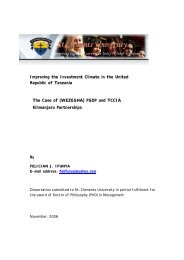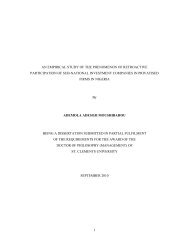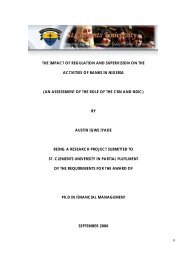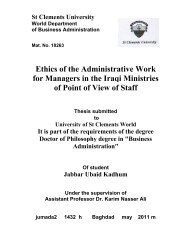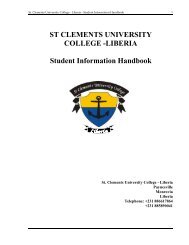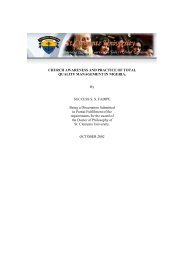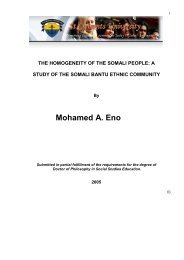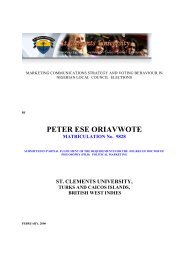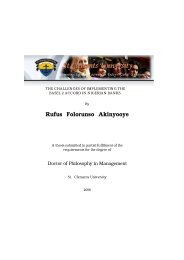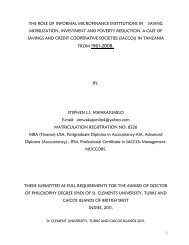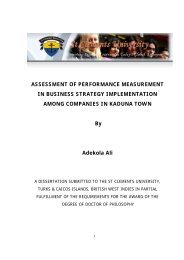- Page 1 and 2: St. Clements University “Factors
- Page 3 and 4: 3.14 Procedures ...................
- Page 5 and 6: The United Nations Children's Fund
- Page 7 and 8: sickness (AIDS) in Uganda, (Dodge &
- Page 9 and 10: coping programs usually have a moni
- Page 11 and 12: 3. Peer group influence has no effe
- Page 13: . Those children who are actually l
- Page 17 and 18: In North America, the term school r
- Page 19 and 20: presence of street children phenome
- Page 21 and 22: eports approximately 200,000 child
- Page 23 and 24: and school, the equation of sexual
- Page 25 and 26: Majority of today’s youth faces c
- Page 27 and 28: psychological functioning often wor
- Page 29 and 30: Given the resistance to stereotypic
- Page 31 and 32: frequent colds. In addition, this i
- Page 33 and 34: It is of more than passing interest
- Page 35 and 36: 40% of the sexually active market c
- Page 37 and 38: ecause of poverty, or have run away
- Page 39 and 40: 2.6 Street children in Sierra Leone
- Page 41 and 42: Young girls often are recruited as
- Page 43 and 44: 2.7.1 Economic stagnation There is
- Page 45 and 46: 2.7.2 Child abuse On the streets, o
- Page 47 and 48: the tension-building phase, the inc
- Page 49 and 50: some passing pervert, stealing wall
- Page 51 and 52: mostly in central locations where t
- Page 53 and 54: Most girls made repeated efforts to
- Page 55 and 56: that once he left the street there
- Page 57 and 58: in the streets are that they are mo
- Page 59 and 60: downright criminal activities like
- Page 61 and 62: home. When he finds a group of frie
- Page 63 and 64: The culture of violence gradually b
- Page 65 and 66:
Most children live and grow within
- Page 67 and 68:
money to the national government fo
- Page 69 and 70:
As members of the new homeless, you
- Page 71 and 72:
Illegal activities flourish in the
- Page 73 and 74:
� The media - media give out diff
- Page 75 and 76:
There is a great difference as to h
- Page 77 and 78:
crime-dependent street culture. On
- Page 79 and 80:
tend many machines in the modern fa
- Page 81 and 82:
In other recent studies, the resear
- Page 83 and 84:
According to Donald & Swart-Kruger
- Page 85 and 86:
gives by a significant individual o
- Page 87 and 88:
displayed no signs of delinquency a
- Page 89 and 90:
children’s development could be a
- Page 91 and 92:
have intense behaviour, there is a
- Page 93 and 94:
2.13 Healthy development childhood
- Page 95 and 96:
numerous storms of negative emotion
- Page 97 and 98:
In terms of approach, the study emp
- Page 99 and 100:
3.5 Interview/questionnaire structu
- Page 101 and 102:
Documentary secondary data, accordi
- Page 103 and 104:
different in their means. To assist
- Page 105 and 106:
3.11 Confidentiality The privacy of
- Page 107 and 108:
The interviews were conducted over
- Page 109 and 110:
For the purpose of lucidity, this c
- Page 111 and 112:
58. 53% Gender of children living i
- Page 113 and 114:
In the table and figure above, it s
- Page 115 and 116:
23% Distribution of children in nor
- Page 117 and 118:
43. 40% Distribution of where child
- Page 119 and 120:
shows that more children were born
- Page 121 and 122:
Table 5b and Figure 5b shows the se
- Page 123 and 124:
Table 6d and Figure 6d presents the
- Page 125 and 126:
Percentage of children in normal fa
- Page 127 and 128:
Table 7a Percentage children in nor
- Page 129 and 130:
Percentage of the kind kouse childr
- Page 131 and 132:
Percentage of How many Times Childr
- Page 133 and 134:
108. 99% Percentage of children in
- Page 135 and 136:
espondents includes their gender, a
- Page 137 and 138:
District codes Kenema Male Female 1
- Page 139 and 140:
Bo 27 9 36 Freetown 13 20 33 Total
- Page 141 and 142:
District codes Kenema 140 31 1 0 0
- Page 143 and 144:
Freetown 26 7 33 Total 130 36 166 N
- Page 145 and 146:
Distribution of street children who
- Page 147 and 148:
Figure 16b Percentage of Street Chi
- Page 149 and 150:
How often street children see their
- Page 151 and 152:
their friends. This indicates that
- Page 153 and 154:
town has the highest number of stre
- Page 155 and 156:
ecome stronger with age, in part be
- Page 157 and 158:
Percentage of Street Children who l
- Page 159 and 160:
Table 17g and figure 17g shows that
- Page 161 and 162:
District Codes Kenema 160 9 16 2 0
- Page 163 and 164:
The table and figure above shows th
- Page 165 and 166:
Makeni 8 14 8 30 Bo 4 10 22 36 Free
- Page 167 and 168:
From the table it can be seen that
- Page 169 and 170:
Number of Children 35 30 25 20 15 1
- Page 171 and 172:
30 25 20 15 10 5 0 Kenema Figure 18
- Page 173 and 174:
Total 31 31 54 22 16 12 166 Number
- Page 175 and 176:
Total 44 41 81 166 Figure 20b Table
- Page 177 and 178:
District codes Kenema Town distribu
- Page 179 and 180:
want to go home. They prefer going
- Page 181 and 182:
Table 21e and figure 21e illustrate
- Page 183 and 184:
39. 23% Figure 22a Percentage of wh
- Page 185 and 186:
143. 87% Figure 23a Distribution of
- Page 187 and 188:
Distribution of offences for which
- Page 189 and 190:
committed and these children have a
- Page 191 and 192:
100 80 60 40 20 Cross analysis: Gen
- Page 193 and 194:
Number of Children 70 60 50 40 30 2
- Page 195 and 196:
Figure 24f 150 100 50 0 and street
- Page 197 and 198:
Table 24h Children in Normal family
- Page 199 and 200:
100 90 80 70 60 50 40 30 20 10 0 Ch
- Page 201 and 202:
the construction of houses, this is
- Page 203 and 204:
for a crime. Only seven children fr
- Page 205 and 206:
24b2 Confidence level: 95% Meana-Me
- Page 207 and 208:
Descriptive statistics: Children in
- Page 209 and 210:
Standard error of difference 13.32
- Page 211 and 212:
Descriptive statistics: Children in
- Page 213 and 214:
Standard error of difference 54.03
- Page 215 and 216:
children lived in 24j1 Independent
- Page 217 and 218:
Standard error of difference 35.87
- Page 219 and 220:
Independent samples t-test 24l2 Con
- Page 221 and 222:
There are many reasons that have be
- Page 223 and 224:
adolescence, a child’s desire for
- Page 225 and 226:
children within such settings, a su
- Page 227 and 228:
children will no longer return home
- Page 229 and 230:
lives exacerbate their emotional pr
- Page 231 and 232:
In most cases, street children and
- Page 233 and 234:
there are more female children on t
- Page 235 and 236:
help fend for themselves and their
- Page 237 and 238:
They have an acute awareness of the
- Page 239 and 240:
Seeing their problems against the b
- Page 241 and 242:
midst of a government-waged war on
- Page 243 and 244:
intervention strategies generally r
- Page 245 and 246:
When a street child is reported to
- Page 247 and 248:
Personal characteristics include in
- Page 249 and 250:
visitation programs, service networ
- Page 251 and 252:
McWhirter (2004) stated that essent
- Page 253 and 254:
Yours faithfully, Prince Cummings P
- Page 255 and 256:
Yours faithfully, Prince Cummings P
- Page 257 and 258:
Yours faithfully, Prince Cummings P
- Page 259 and 260:
258 5. The researcher may be expect
- Page 261 and 262:
16. Where were you born? 260 01. We
- Page 263 and 264:
13. Where are your parents? 14. Are
- Page 265 and 266:
Bamurange V (1998) “Relationships
- Page 267 and 268:
Mafuba, C (1994) “Poverty spawnin
- Page 269 and 270:
Youth at the Crossroad of Custom an
- Page 271 and 272:
Miller, PA, Ryan, P & Morrison, W (
- Page 273 and 274:
Mafuba, C (1994) “Poverty spawnin
- Page 275 and 276:
Beaudoin, M-N (2001) “Promoting R



